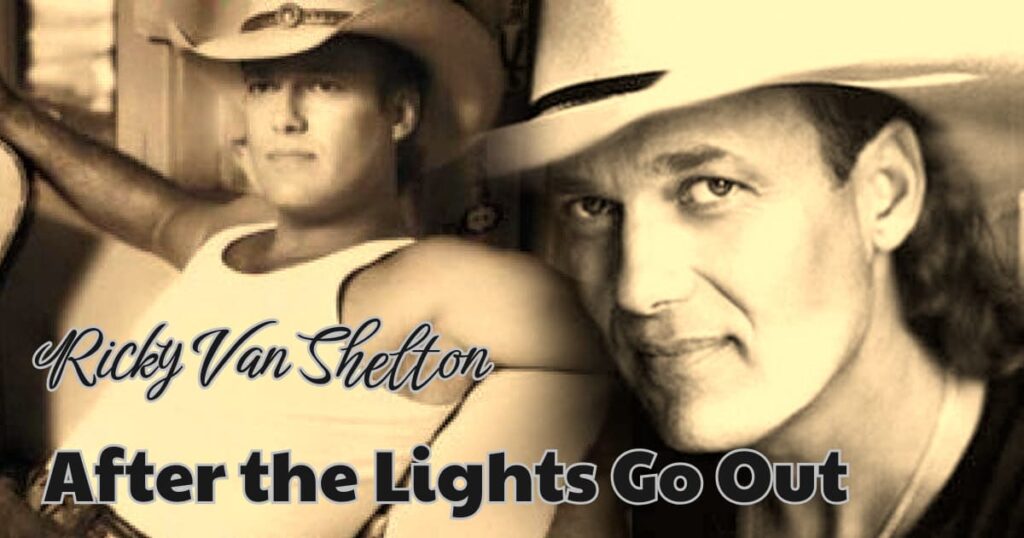
Ricky Van Shelton’s “After the Lights Go Out”: A Timeless Ballad of Enduring Love and Lingering Absence
Ah, Ricky Van Shelton. Just hearing that name conjures up images of a simpler time, doesn’t it? A time when country music still had that raw, heartfelt edge, before the gloss and crossover appeal took hold in quite the same way. For those of us who came of age with his music, he was more than just a singer; he was a voice that understood the quiet ache, the tender longing, and the profound comfort of home and hearth. Today, we’re going to turn our thoughts to a song that perfectly encapsulates that feeling, a track that might not have hit the very top of the charts, but certainly found a permanent place in the hearts of many: “After the Lights Go Out.”
Released in November 1991 as the third single from his platinum-selling album Backroads, “After the Lights Go Out” climbed to a respectable No. 13 on the U.S. Billboard Hot Country Songs chart and reached No. 8 in Canada. While Ricky Van Shelton had enjoyed a string of chart-topping hits by this point—songs like “Somebody Lied,” “I’ll Leave This World Loving You,” and the unforgettable duet “Rockin’ Years” with Dolly Parton—this particular ballad proved to be a more subtle, yet equally impactful, entry into his rich discography. It showcased his remarkable ability to convey deep emotion with a smooth, resonant baritone that was often compared to the legendary voices of Eddy Arnold and Jim Reeves.
The story behind “After the Lights Go Out” is less about a dramatic personal event in Ricky Van Shelton‘s life and more about the timeless theme it explores. The song itself was written by Warner Mack (credited to his real name, Warner McPherson) and originally released back in 1973. Shelton, a staunch traditionalist in an era that was beginning to embrace a more contemporary country sound, was known for selecting songs that resonated with classic country sensibilities. His personal struggles with addiction, which he has openly discussed, were certainly a backdrop to his career in the early ’90s, lending an undeniable gravitas to his performances. While “After the Lights Go Out” doesn’t directly address addiction, the underlying vulnerability and yearning for constancy found within the lyrics could certainly have found a deeper resonance within Shelton‘s own life experiences at the time.
At its core, the meaning of “After the Lights Go Out” is a poignant reflection on the quiet intimacy and profound connection that exists between two people when the day fades and the world outside goes silent. It speaks to the comfort of shared presence, the unspoken understanding, and the security found in knowing that even in the darkness, you are not alone. The lyrics paint a picture of a relationship where the deepest bonds are forged not in grand gestures, but in the tender moments of quiet companionship after the hustle and bustle of life have ceased. It’s about that feeling of absolute belonging, of having a sanctuary in another person’s arms, a feeling that only truly comes alive when the distractions of the world are stripped away.
Think about it for a moment, those of us who have lived a few decades. The world often demands so much of us, pulls us in so many directions. There are careers to build, children to raise, bills to pay, and a thousand other clamoring voices vying for our attention. But there’s a sacred space, isn’t there, when the day is done, the doors are locked, and the house settles into its own quiet rhythm. It’s in that space, “after the lights go out,” that true love truly breathes. It’s where vulnerabilities are shared, where fears are whispered, and where the simple act of holding hands in the dark can speak volumes. This song perfectly captures that profound sense of peace and security, that unwavering connection that makes all the daytime struggles seem a little less daunting. It’s a testament to the enduring power of love that blossoms in the quiet moments, a gentle reminder that the most precious things in life are often found not in the spotlight, but in the soft glow of a shared intimacy, long after the world has dimmed.